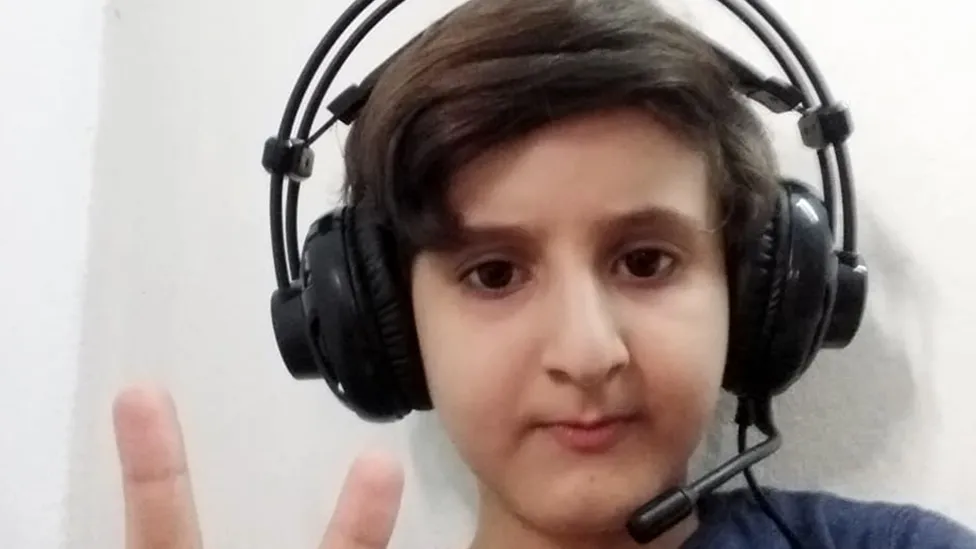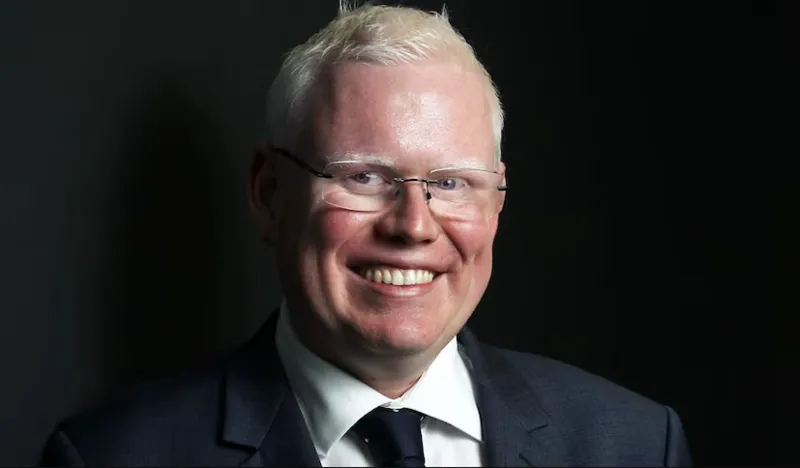Awni Eldous: The Palestinian boy who found YouTube fame after death
After Awni Eldous died, his dreams came true.

In a video posted in August 2022, he holds a microphone and smiles as he declares his ambitions for his YouTube gaming channel.
"So now folks, let me introduce myself: I am a Palestinian from Gaza, aged 12 years old. The aim of this channel is to reach 100,000 subscribers, or 500,000, or one million," he says.
He ends the short video saying "peace out" to his 1,000 subscribers before walking out of view.
Just over a year later, Awni became one of the first Palestinian children to be killed in the war.
Relatives say Awni's family home was hit in an Israeli strike on 7 October, just hours after Hamas gunmen stormed across the border into Israel, killing some 1,200 people and taking 240 hostage.
Awni's video now has millions of views - and other videos in which he voicelessly plays computer games have millions more. Nearly 1.5 million people have subscribed to his YouTube channel.
To his aunt, Ala'a, he was a happy, confident and helpful boy who would hold the door open for her. Another family member called him "engineer Awni" because of his love of computers.
To others, this 13-year-old gamer has become a kind of symbol, representing the loss of children in the Gaza Strip. "Please forgive us," reads one comment on his video. "I wish we knew you before you died."
The Hamas-run health ministry in Gaza says more than 20,000 people have been killed there since the war began - more than a third of them children. The UN children's agency (Unicef) has described it as the "most dangerous place in the world to be a child".
'It was sudden, boom'
The day of the Hamas attack, as Israel began to retaliate, Ala'a imagined a bomb destroying her family's home in Gaza City. That night, around 20:20, her phone lit up with messages from friends: Awni's family home had been hit.
A different branch of the family lived on each floor of the three-storey building in the Zeitoun neighbourhood. Awni lived on a floor with his mum and dad, his two older sisters, and two younger brothers.
The strike was also documented in October by human rights group Amnesty International.
"Two bombs fell suddenly on top of the building and destroyed it. My wife and I were lucky to survive because we were staying on the top floor," Awni's uncle Mohammed said.
Both he and a neighbour said they had received no warning. "It was sudden, boom," the neighbour said.
The Israel Defense Forces (IDF) did not comment on this specific strike but said it was striking military targets and that Hamas had a "documented practice of operating from nearby, underneath and within densely populated areas".
It said: "The IDF's strikes on military targets are subject to relevant provisions of international law, including the taking of feasible precautions and after an assessment that the expected incidental damage to civilians and civilian property is not excessive in relation to the expected military advantage from the attack."
It added that the IDF "regrets any harm caused to civilians or civilian property as a result of its operations, and examines all its operations in order to learn and improve and ensure all activity was in accordance with operational procedures and the law".
'He wanted followers and fans'
Ala'a didn't want to believe the messages she was receiving. But after connecting to the wi-fi, she saw that a close friend of the family had shared a photo of her brother on social media with the caption: "Rest in peace." She ran to the hospital.
"They asked me to see the bodies but my husband refused… he wanted me to remember their beautiful faces when they were alive," she says in a Facebook message, sent from the south of Gaza, where she is now displaced.
Ala'a says 15 members of her family were killed that night, among them Awni.
She describes him as being a calm, helpful boy. His dad was a computer engineer and Ala'a says that for as long as she can remember, Awni would copy his father, pulling laptops apart and then trying to piece them back together.
In photos Awni shared on his own Facebook page, he stands in front of a blackboard holding up a computer motherboard to fellow students, as he leads a technology lesson organised as part of a "little teachers" scheme. Pictures published on his school's Facebook page show him winning numerous awards.
Shortly after his death, one of his teachers shared a photo with Awni, describing the boy's "ever-lasting smile".
Outside of school, Ala'a says Awni loved spending time with his family. On one "very wonderful night", Ala'a says she watched a film with Awni and his siblings, sharing crisps and chocolates.
The last time she saw him was at a family breakfast three weeks before his death, where she looked at her nephew and said: "Awni is becoming a man."
Mostly, Awni loved computers and gaming, and he idolised the YouTubers who made careers out of his hobby.
"He wanted to be like them - to have followers and fans," Ala'a says.
Awni started his channel in June 2020. His videos show him playing Pro Evolution Soccer, the car racing game Blur and the first-person shooting game Counter-Strike.
Long captions give details of the games, the companies that made them and the dates of their release.
In a video of Awni with an uncle, the pair promise a "special" range of content on the channel, declaring in unison: "It will be a blast."
They grin and gesticulate as they take it in turns to talk. They say they plan to expand the channel to include vlogs and interviews.
Ashraf Eldous, a distant relative of Awni who works as a programmer and helps run several YouTube channels, says the teenager would frequently contact him asking for advice.
In messages from August 2022, shared with the BBC, Awni addresses "brother Ashraf" as he asks for YouTube tips. He would even take his father's phone in secret to ask for advice, Ashraf recalls.
Ashraf says the last time he spoke to Awni's father, he was told: "Take care of Awni. Answer his questions. He's ambitious."
"His ambition was to be my competitor or colleague," Ashraf says. "He created a YouTube channel. It wasn't that big, it didn't have any big views. Every start-up is hard at the beginning."
But after Awni's death in October, the views mounted when his fledgling channel caught the attention of established YouTubers, including Kuwaiti gamer AboFlah.
In an emotional video now viewed almost nine million times, AboFlah cries and walks away from the camera.
He has just discovered messages Awni had sent him on social media.
One of those message says: "Nothing compares to Palestine's winter in Gaza; the atmosphere is legendary. We're drinking sahlab [a sweetened milk drink]. It's so good. We're also eating roasted chestnuts. I hope you come to Palestine. Much love."
In another, Awni writes to AboFlah: "You're a legend and a role model."
In the video, as AboFlah weeps, he says: "It's such a shame for this child to die… This child is one of many others who are even younger than him. If God wills it, they'll be birds of paradise."
"What you see is from the heart. I could not stop my tears," AboFlah tells the BBC, reflecting on the video he uploaded in October.
"It was very touching to hear that he looked up to me as a role model."
Asked why he thinks Awni has made such a big impact, AboFlah says: "Fans see themselves in Awni. We are all Awni."
The teenager's entire family - his four brothers and sisters and mother and father - were killed alongside him. But his surviving relatives say they are proud of the fame he has found after death.
"It's a gift from God that so many people around the world love Awni," says Ala'a.
"He used to talk about it enthusiastically, about his channel. He is more happy in heaven now."
-bbc







